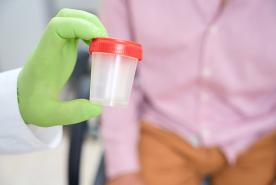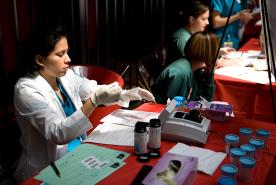One of the most common questions asked by parents of children with kidney disease is whether contact sports are safe. Physical activity is very important for overall health and this is especially true for children with kidney diseases. Chronic kidney disease (CKD) can increase the risk for heart disease and physical activity is important in preventing heart disease. Team sports and activities play a large role in encouraging kids to be physically active, especially during childhood. Because of the many benefits of physical activity, it should only be restricted when absolutely necessary.
Understandably, parents are worried about injuries to their child’s kidney. But, kidney injuries are actually very uncommon. In fact, most kidney injuries are minor and do not result in permanent loss of kidney function. Motor vehicle accidents are the most common cause of kidney injuries. The next most common cause of kidney injuries are horseback riding and bicycle accidents. Even though bicycle accidents cause a large number of kidney injuries, these injuries are still very uncommon. Contact sports that are usually considered high-risk, such as football, hockey, and soccer, can cause kidney injuries but it is uncommon.
Most children with kidney disease are not at higher risk for kidney injuries during contact sports. However, injuries can occur so it is important to discuss the risk and your concerns with your child’s healthcare professional before your child participates in any contact sports. Special padding (kidney guards) are available and may offer additional protection. These products are not formally tested like other protective gear such as helmets but may provide some benefit.
There are several kidney diseases in children that can result in higher-risk for injury and require further discussion with your child’s healthcare professional, such as:
Solitary Kidney / Kidney Transplant
Children with a solitary kidney are not at higher risk for injury during contact sports, but if an injury occurred it could result in loss of kidney function and the need for dialysis or transplantation. Having a solitary kidney is not an absolute contraindication to participation in contact sports; however, families need to be aware of the potential complications from a kidney injury. Kidney guards can be considered.
Hydronephrosis / UPJ Obstruction / Cystic Kidney Disease / Horseshoe Kidney
Children with hydronephrosis, kidney cysts, and horseshoe kidney could be at higher risk for kidney trauma. Therefore, it may be recommended that your child avoid participating in contact sports. However, it’s important to discuss the risks for your child with your child’s healthcare professional.
High Blood Pressure / Hypertension
Strenuous physical activity can be dangerous if your child has uncontrolled high blood pressure and should be avoided until well-controlled. Even competitive athletes in high-activity sports (weight-lifting, boxing, and wrestling) need to avoid sports until their blood pressure is under control. Once blood pressures are controlled there are no restrictions on physical activity or contact sports.
In summary, kidney injuries are rare and are typically associated with motor vehicle accidents. Most kidney injuries associated with contact sports are relatively mild. Children with kidney diseases may be at higher risk for loss of kidney function following kidney injury and additional prevention strategies may be required. The table below summarizes the potential risk of kidney injury with various physical activities. This information does not replace the need for a discussion with your child’s healthcare professional prior to participation in any contact sport.
Extreme skiing/snowboarding
Bicycle riding
Football
Basketball
Horce racing
Horseback riding
Ice hockey
Baseball
Off road biking
Boxing
Snowboarding
Lacrosse
Martial arts with contact/sparring
Skiing
Running
Soccer
Rollerblading
Sledding
Skateboarding
Wrestling
Table adapted from: Papaglannopoulos D, Gong E. Urology. 2017; 101: 9-14.








